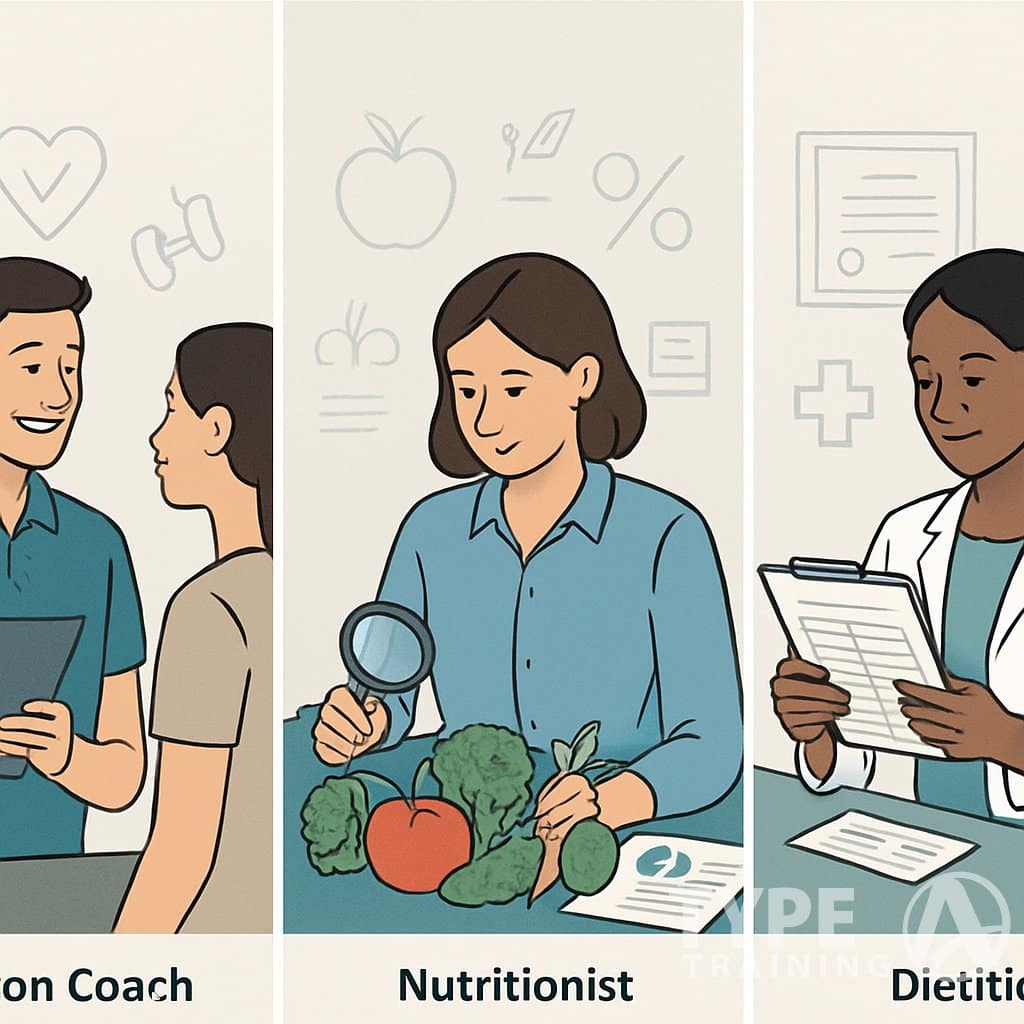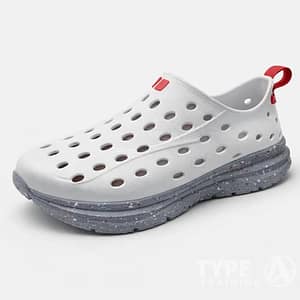When you’re searching for nutrition guidance, you’ll run into three main types of professionals: nutrition coaches, nutritionists, and dietitians. People often use these titles interchangeably, but honestly, they mean pretty different things.

Dietitians have the most education and can provide medical nutrition therapy. Nutritionists have varying credentials, and nutrition coaches focus on general wellness guidance instead of medical treatment. It’s important to know these differences before choosing someone to trust with your health.
The best professional for you depends on your needs, health conditions, and goals. Sometimes you need a registered dietitian’s expertise, and other times, a nutrition coach’s personalized approach works better.
Popular posts:
Key Takeaways
- Dietitians need the most formal education and can treat medical conditions through nutrition therapy.
- Nutritionist credentials can vary a lot by state—some require degrees, some don’t regulate the title at all.
- Nutrition coaches help with lifestyle changes and general wellness but don’t handle medical nutrition treatment.
Defining Nutrition Coach, Nutritionist, and Dietitian

These three professionals have different backgrounds, legal requirements, and areas of focus. Registered dietitians have the most formal education and can provide medical nutrition therapy. Nutritionists and nutrition coaches usually work on general wellness and lifestyle changes.
What Is a Nutrition Coach?
A nutrition coach is a trained mentor who helps you make better food choices and develop healthier eating habits. You’ll work together to set goals and stick to your nutrition plan.
Key responsibilities include:
- Creating meal plans based on your lifestyle
- Teaching you about portion sizes and food groups
They also help you build sustainable eating habits and offer motivation and support.
Nutrition coaches usually complete certification programs that last anywhere from a few weeks to several months. These cover basic nutrition science and coaching skills.
You don’t need a college degree to become a nutrition coach. Most states don’t regulate the title, so requirements are all over the place.
Nutrition coaches focus on behavior change instead of treating medical conditions. They dig into why you eat what you do and help you make better choices.
What Is a Nutritionist?
A nutritionist is a pretty broad term for someone who works in the nutrition field. In most states, the title “nutritionist” isn’t regulated, so anyone can use it.
Some nutritionists have a lot of education, but others might have barely any formal training. You might meet nutritionists with backgrounds like:
- Certified Nutrition Specialist (CNS) with advanced degrees
- Holistic nutritionists who focus on whole-body wellness
Some are self-taught and have no formal credentials.
Many nutritionists work in wellness centers, gyms, or private practice. They usually focus on general health improvement, not medical conditions.
Because there’s not much regulation, it’s smart to check their credentials. Some have master’s degrees in nutrition science; others might just have completed online courses.
What Is a Dietitian?
A dietitian—specifically a Registered Dietitian (RD) or Registered Dietitian Nutritionist (RDN)—is a licensed healthcare professional. You can trust they’ve met strict education and training standards.
Education requirements include:
- Bachelor’s degree in nutrition, dietetics, or a related field
- Supervised practice hours
- Passing a national exam
- Continuing education to keep their license
Registered dietitians work in hospitals, clinics, and other healthcare settings. They assess, diagnose, and treat nutrition-related health issues.
Unlike nutritionists or nutrition coaches, RDs and RDNs can provide medical nutrition therapy. They help manage conditions like diabetes, heart disease, and eating disorders.
The RD and RDN titles are the same—just updated in 2013 to include “nutritionist.”
Education, Credentials, and Training Pathways

Each nutrition job requires different education levels and training. Registered dietitians need the most formal education. Nutrition coaches have more flexibility.
Qualifications and Degrees
Registered Dietitian requirements are strict. You need a bachelor’s degree in nutrition, dietetics, or a related field from an ACEND-accredited program. Nowadays, most states want you to have a master’s degree, too.
Your classes will cover chemistry, biochemistry, anatomy, and food science. This all preps you for the national exam and clinical work.
Nutritionists have different education requirements depending on your state. Some states want a bachelor’s degree in nutrition or health science, while others let you use the title without any formal education.
If you want the Certified Nutrition Specialist (CNS) credential, you’ll need a master’s or doctoral degree. That makes CNS nutritionists pretty similar to dietitians in terms of education.
Nutrition coaches have the most flexible path. No college degree required. Many coaches come from fitness, health, or other backgrounds.
Some nutrition coaches do have degrees in related areas, which can help them work with clients more effectively.
Certification and Licensure Requirements
Registered Dietitians have to pass the national exam from the Commission on Dietetic Registration (CDR). This tests your nutrition science know-how and practice skills. Once you pass, you get the RD credential.
Most states also require dietitians to get a state license. You’ll see titles like Licensed Dietitian (LD) or Licensed Dietitian Nutritionist (LDN).
Nutritionists face different rules everywhere. Some states protect the nutritionist title and require licenses. Others don’t regulate it at all.
The CNS certification means passing a national exam and putting in 1,000 hours of supervised practice first.
Nutrition coaches can pick from a bunch of certification programs—NASM, ISSA, and Precision Nutrition are popular. These usually take a few months.
Most nutrition coach certifications don’t require supervised practice. You can usually start working with clients as soon as you pass the exam.
Supervised Practice and Internships
Registered Dietitians have to complete 1,000 to 2,000 hours of supervised practice. This happens through an ACEND-accredited dietetic internship. You’ll rotate through clinical, food service, and community nutrition.
Dietetic internships are tough to get. Only about half of applicants get matched with a program each year.
CNS Nutritionists need 1,000 hours of supervised practice too. You can do this through various programs or under qualified professionals.
Nutrition Coaches usually don’t need supervised practice hours. Some certification programs have practical parts, but they’re not always required.
Continuing Education
Registered Dietitians must complete 75 continuing education hours every five years. The CDR sets these rules.
You can get credits at conferences, workshops, online courses, or by doing professional activities. Some credits have to be in specific topics.
CNS Nutritionists need 40 continuing education hours every two years to stay current.
Nutrition Coaches have different requirements depending on their certification. NASM and ISSA both want 20 continuing education credits every two years.
Most certifying bodies offer online courses and workshops to help you keep up.
Scope of Practice and Services Provided
Each nutrition professional works within certain legal boundaries and offers different services. Dietitians provide medical nutrition therapy in clinical settings. Nutrition coaches focus on wellness support and behavior change for healthy people.
Medical Nutrition Therapy and Clinical Nutrition
Registered dietitians have the widest scope for medical care. They provide medical nutrition therapy (MNT) for diseases like diabetes, heart disease, and kidney problems.
Clinical Services Dietitians Provide:
- Nutrition therapy for medical conditions
- Eating disorder treatment
- Dietary prescriptions in hospitals
- Nutrition care for cancer patients
- Managing nutrition for dialysis patients
Dietitians work as part of medical teams in hospitals and clinics. They diagnose nutrition-related problems and create treatment plans.
Nutritionists might provide some clinical services, but state laws limit what they can do. Usually, their scope is more restricted than a dietitian’s.
Nutrition coaches can’t provide medical nutrition therapy. If clients have medical conditions, coaches need to refer them to dietitians or doctors.
Nutrition Coaching and Wellness Support
Nutrition coaches help healthy people make better food choices. They focus on wellness and prevention, not treating diseases.
Key Services Nutrition Coaches Provide:
- Weight management support
- Nutrition education for general health
They also offer sports nutrition for athletes, supplement guidance for healthy people, and online coaching programs.
Nutrition coaches use motivational interviewing to help clients change habits. They provide accountability and support along the way.
Most nutrition coaches work with people who want to lose weight, gain energy, or just feel better. They don’t work with clients who have serious medical issues.
Meal Planning and Healthy Eating Guidance
All three professionals can help with meal planning, but their approaches are different.
Dietitians create detailed nutrition plans for medical conditions. They calculate nutrient needs and track progress with lab work.
Nutritionists might develop meal plans for general health or goals like weight loss. Their plans often focus on whole foods and balance.
Nutrition coaches give practical meal planning advice. They help clients make healthy choices that fit their lifestyle and budget.
Some meal plans are complex and medical, while others are more about sustainable, everyday healthy eating.
Behavior Change and Goal Setting
Nutrition coaches are great at helping people change eating habits through goal setting and behavior tweaks.
Common Behavior Change Methods:
- Setting small, realistic nutrition goals
- Tracking food and progress
They also help clients spot triggers for unhealthy eating and build new habits over time.
Dietitians use behavior change techniques too, especially when helping patients stick to medical nutrition therapy. They mix clinical knowledge with counseling skills.
Nutritionists might use goal setting as well, but their training in behavior change depends on their background.
The real key to any nutrition program is whether clients can make lasting changes. Professionals who understand both nutrition and human behavior tend to help clients get the best results.
Comparing Career Opportunities and Work Environments
Each nutrition professional works in different settings based on their training and scope. Registered dietitians have the most access to healthcare facilities. Nutrition coaches usually stick to wellness and fitness spaces.
Healthcare Settings
Registered dietitians lead in clinical healthcare settings. You can work in hospitals, nursing homes, rehab centers, and clinics. These jobs need your medical training and ability to provide medical nutrition therapy.
RDs in hospitals create nutrition plans for patients with diabetes, heart disease, and other conditions. You might work with doctors on tube feeding or help patients recover after surgery.
Nutritionists have fewer opportunities in healthcare. Some states let certified nutritionists work in hospitals or clinics, but the requirements are all over the map. You usually need extra certifications or to work under an RD.
Nutrition coaches can’t work in medical settings. Your scope doesn’t include treating medical conditions or working with patients who have diagnosed diseases.
Private Practice and Wellness Industry
All three professionals can build private practices, but they each bring something different to the table. Registered dietitians in private practice treat medical conditions and accept insurance payments.
You might work with clients who have eating disorders, diabetes, or digestive issues. That’s a pretty specialized group, and it takes some extra training.
Nutritionists tend to thrive in wellness centers, spas, and community health programs. You’ll focus more on general health improvement and preventing disease, not medical treatment.
Nutrition coaches have really found a niche in the wellness industry. You help clients with weight management, building healthy eating habits, and making lifestyle changes.
A lot of nutrition coaches work remotely or sell online programs. That flexibility can be a major plus.
Health coaches often overlap with nutrition coaches in these settings. They usually provide broader lifestyle guidance, not just nutrition.
Fitness and Sports Nutrition
The fitness industry offers a lot of opportunities for nutrition professionals. Sports nutrition specialists can come from any background, and requirements really depend on the employer.
Nutrition coaches are pretty popular in gyms and fitness centers. You’ll help members reach their fitness goals with better nutrition.
Many personal trainers become nutrition coaches to expand what they offer. It just makes sense.
Registered dietitians with sports nutrition expertise work with pro athletes and sports teams. You can provide advanced performance nutrition and help athletes who have medical conditions.
Nutritionists often work in fitness settings, wellness retreats, and sports facilities. You might focus on performance nutrition for recreational athletes.
How to Choose the Right Nutrition Professional for Your Needs
Your health goals, medical conditions, and budget all play a part in which nutrition expert fits you best. Ask yourself if you need basic lifestyle guidance or something more medical.
Factors to Consider
Your Current Health Status matters a lot. If you have diabetes, heart disease, or other medical conditions, you need a registered dietitian for medical nutrition therapy.
Budget and Insurance Coverage come into play. Registered dietitians often accept insurance if it’s for a medical condition. Nutrition coaches and nutritionists usually charge out-of-pocket.
Type of Support You Want is important too. Do you need:
- Basic meal planning and healthy eating tips
- Weight loss guidance and accountability
- Medical nutrition therapy for health conditions
- Sports nutrition for athletic performance
Location and Availability might limit your choices. Rural areas may have fewer registered dietitians. Luckily, lots of nutrition professionals offer virtual sessions now.
Certification and Credentials can vary a lot. Always check their qualifications before you start working with someone.
Understanding Your Health Conditions
Medical Conditions almost always require a registered dietitian. That includes diabetes, kidney disease, heart disease, and eating disorders.
Dietitians have the right medical training for safe nutrition advice in these situations. Don’t take chances here.
Digestive Issues like IBS or food allergies need professional medical guidance. A registered dietitian can help you spot trigger foods and create safe meal plans.
Pregnancy and Breastfeeding come with unique nutrition needs. It’s best to choose a dietitian who specializes in maternal nutrition for advice during this time.
General Wellness Goals—think weight loss or more energy—can often be handled by nutrition coaches or nutritionists. They’re a good fit for lifestyle changes.
Athletic Performance needs depend a lot on your sport and goals. Some registered dietitians specialize in sports nutrition, but certified sports nutritionists can help too.
Making an Informed Decision
Research Their Background before picking any nutrition expert. Look into their education, certifications, and real experience with your type of goals.
Ask About Their Approach to see if it actually fits you. Some folks push strict meal plans, while others encourage more flexible eating habits.
Consider Your Learning Style when making a choice. Do you like one-on-one coaching, group sessions, or maybe online programs? Not every professional offers the same setup.
Start with a Consultation to get a feel for how you connect with the nutrition expert. Communication really matters here.
Verify Insurance Coverage if you’re worried about cost. Just call your insurance company and ask which nutrition pros they’ll cover for your situation.










